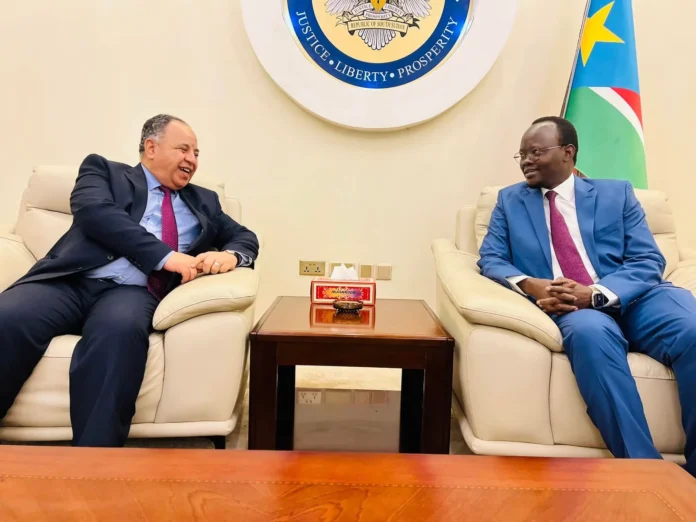Minister of Finance Mohamed Maait has said that Egypt is keen to support South Sudan in achieving its development goals, especially in the economic and financial fields.
Maait’s remarks came during a meeting with Bak Barnaba Chol, Minister of Finance and Planning of South Sudan, and the accompanying delegation on Wednesday.
Maait said that Egypt is ready to share its expertise in developing and automating the tax and customs systems, which would enhance governance, integrate the informal economy, facilitate trade, and improve the public financial management of the state. He added that this would help decision-makers deal with the global economic challenges and the pressures on the budgets of various countries, especially emerging economies.
Bak Barnaba Chol thanked President Abdel Fattah Al-Sisi for his support for peace, stability, and development efforts in South Sudan. He expressed his appreciation for the strong political will to strengthen the cooperation between the two sister countries. He also said that he looked forward to benefiting from Egyptian experiences and expertise in localizing financial technology and adopting advanced systems in updating the tax and customs systems.
Ramy Youssef, Assistant Minister of Finance for Tax Policies, said that the Egyptian government aspires to deepen cooperation with South Sudan in the field of preventing tax duplication and encouraging investment. He said that the ministry is ready to transfer its expertise in updating and automating the tax system, including the application of electronic invoices and receipts. He said that this helped to capture the tax community more accurately and expand the tax base by integrating the informal economy into the formal economy.
Al-Shahat Ghatoury, Head of the Customs Authority, said that the Egyptian experience relies on connecting all ports through the unified electronic platform “Nafeza,” with the establishment of advanced logistics centers and the implementation of the Advance Cargo Information system “ACI”. He said that this simplifies procedures, reduces customs clearance time, enhances governance, and aims to facilitate trade movement between the two sister countries.
Waleed Abdullah, Head of the General Budget Sector at the Finance Ministry, said that Egypt has succeeded in automating the preparation, implementation, and control of the general state budget using the latest global practices and advanced technologies. He said that this enabled the determination of the size of the general treasury revenues and expenses in real-time, thus enhancing financial discipline and estimating the sound position to make any accurate decision related to the public finances of the state, especially in the face of global crises and challenges.
Hossam Hussain, Advisor to the Minister of Finance for External Relations, said that the signing of the Memorandum of Understanding between the two sides contributes to pushing forward the relations of cooperation. It includes launching a high-level dialogue institutionally between the two finance ministries, held once a year, to discuss financial developments regionally and internationally, and everything related to financial policies, as well as exchanging experiences to keep pace with global economic developments and exploring technical cooperation opportunities.
Abdul Aziz Hashem, Advisor to the Minister of Finance for Institutional Development, mentioned that the administrative structure of the Ministry of Finance has been developed to contribute to the sustainability of the capabilities and efficiency of its employees in various sectors, honing them with the necessary skills to keep pace with the comprehensive and integrated development process and the newly introduced electronic systems. This is to continuously qualify them for the optimal employment of modern technology in performing their duties at their best, contributing to facilitating citizens’ access to high-quality services.
The meeting was attended by Ahmed Kouchouk, Deputy Minister of Finance for Financial Policies and Institutional Development; Ehab Abu Eish, Deputy Minister of Finance for the General Treasury; Mona Nasser, Assistant Minister of Finance for Follow-up and Management of Customs Development Projects; Fayez El-Daba’ani, Head of the Tax Authority; Ahmed Abdel-Razek, Permanent Undersecretary of the Ministry of Finance; Mohamed Ibrahim, Assistant Minister for Financial and Economic Affairs; Ibrahim Sahrhan, Chairperson and Managing Director of e-finance Group; Hossam El-Ghoul, CEO of e-finance; Doaa Hamdi, Head of the Foreign Relations Unit at the Ministry of Finance; and the accompanying delegation of the Minister of Finance and Planning of South Sudan.
Source: Zawya

